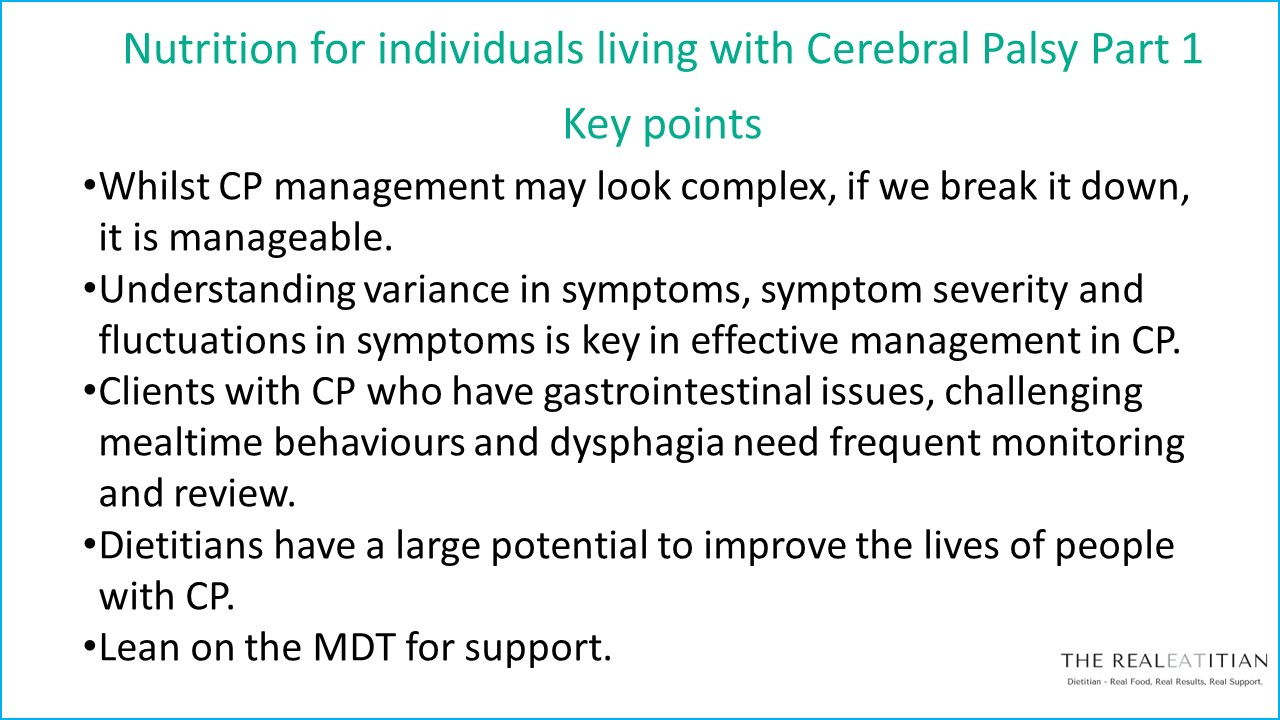Nutrition for people living with Cerebral Palsy Part 1 by Shannyn Thatcher, APD
 Anthea Talliopoulos, APD
Anthea Talliopoulos, APD
Cerebral Palsy is neurological condition that impairs a person’s movement and muscle coordination, resulting in permanent difficulties in motor control, coordination, and balance. The symptoms of Cerebral Palsy include muscle weakness, muscle spasticity (stiffness), impaired muscle coordination, involuntary muscle movements, high or low muscle tone, a lack of muscle reflex, effected balance and posture, difficulties with fine motor skills, and speech impairments. From a nutritional point of view, these symptoms can result in dysphagia through an inability to safely initiate and coordinate a swallow and an impaired swallow reflex, a lack of energy to chew adequately, and inability to maintain head and neck control.
In assessing individuals with Cerebral Palsy, ensuring adequate fluids, energy, protein, and fibre is critical, as this can be affected by swallowing issues, texture or fluid modification, and tube feeding. Further to this, the symptoms of muscle spasticity, difficulties with balance and posture, high muscle tone, dystonia, impaired muscle coordination, and immobility can affect gastric motility and passage. This can result in reflux, vomiting, pain, bloating and/ or gastroparesis. Symptoms such as involuntary muscle movements, dystonia, high/ low muscle tone, speech impairments, difficulties with balance and posture, and difficulties with fine motor skills can also affect mealtime experience.
Understanding the role and input of each member of the multidisciplinary team in managing these clients is also important. This may include the input and assessment of a speech pathologist in assessing the swallow of these clients, and a physiotherapist in providing massage and stretching routines prior to eating.
Overall, the symptoms of Cerebral Palsy can vary across individuals, and it is our role as dietitians to support clients where they are at for a positive meal experience and ensure that they are meeting their nutritional requirements for healthy growth, development, and weight maintenance.
Summary:
- Cerebral Palsy is neurological condition that impairs a person’s movement and muscle coordination, resulting in permanent difficulties in motor control, coordination, and balance.
- From a nutritional point of view, the symptoms of Cerebral Palsy can result in dysphagia through an inability to safely initiate and coordinate a swallow and an impaired swallow reflex, a lack of energy to chew adequately, and inability to maintain head and neck control.
- Managing the symptoms of Cerebral Palsy requires collaborating with the multidisciplinary team, including speech pathologists, physiotherapists, nurses, carers, and anyone else involved in supporting the client.
- It is critical that clients are supported at where they are at to ensure that the mealtime experience is as positive as possible, and that their energy, protein and fluid requirements are met.

Shannyn Thatcher, APD has worked in the disability sector for three years. She is a passionate about supporting people with disabilities to lead more fulfilling, healthier, and happier lives through improved nutrition. Shannyn and her team at The Realeatitian, specialise in complex nutrition care, particularly for individuals living with cerebral palsy (CP), enteral feeding (including blended feeding), and assisting clients in overcoming oral food aversions. Shannyn is a remarkable advocate and resource when it comes to increasing the role of dietitians in the NDIS.